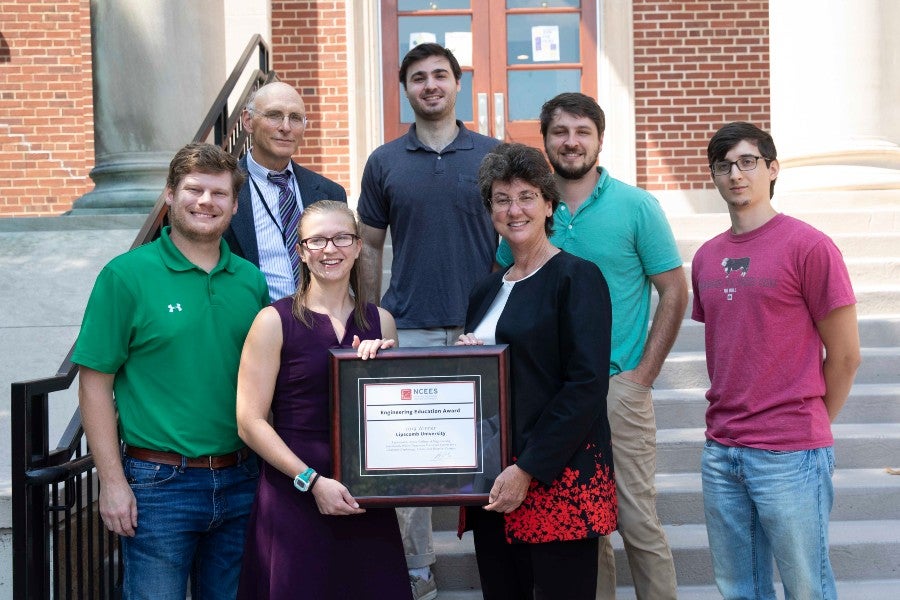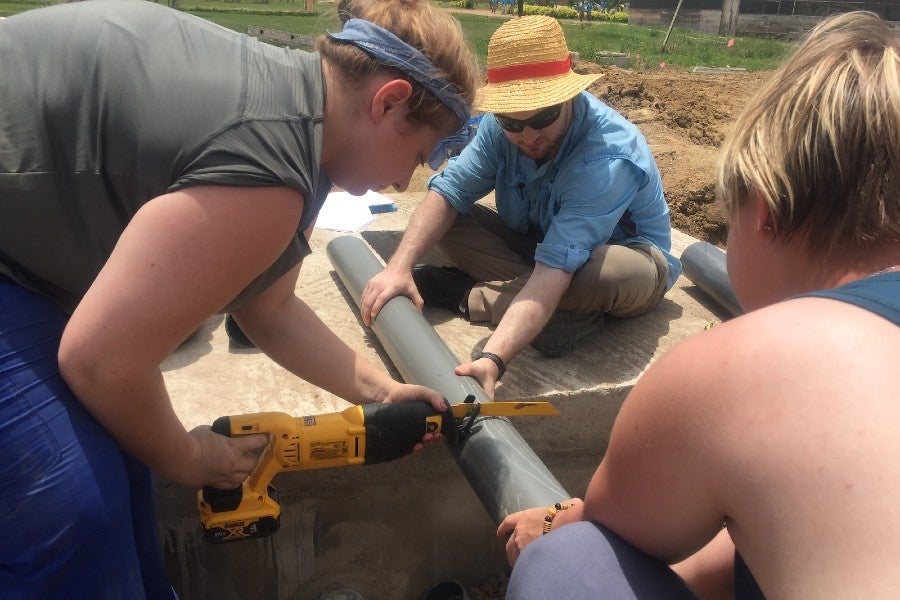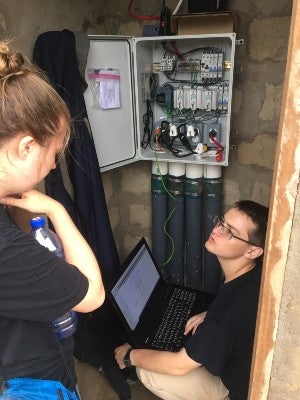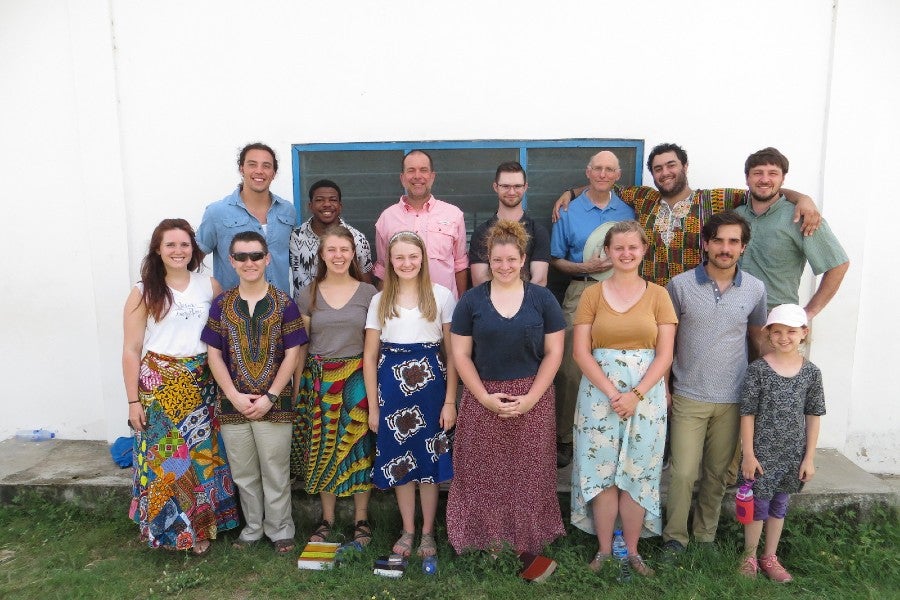Ghana water treatment system wins national award
NCEES honors three-year project to improve water sanitation for Ghana orphanage and school.
Kim Chaudoin |

Members of Lipscomb's Ghana project team accept the National Council of Examiners for Engineering and Surveying 2019 Engineering Education Award.
When a team of students and faculty from the Raymond B. Jones College of Engineering visited Ghana last year to construct a water treatment system to serve an orphanage, school and hospital, they knew their work would have a positive impact in that community. What they did not know is how that work would make an impact on professional engineers more than 5,600 miles away back home in the United States.
In the fall, the College of Engineering was one of seven universities in the nation to receive a National Council of Examiners for Engineering and Surveying Engineering Education Award.
Criteria for the award includes demonstrated collaboration between faculty, students and practicing professionals, the degree to which the project protects the health, safety and welfare of the public and whether or not it is a multi-disciplinary approach to solving a problem.
“Lipscomb is a great diamond for the city of Nashville,” said Kathy Ware, engineer and founder of KS Ware & Associates, in a presentation of the award to the college in September. “It is impressive for you to have earned this honor. These projects require a great amount of manpower and effort, but they never get to the finish line without tremendous leadership.
“I know you have gotten great leadership from many people. I want you to know that that is what engineers do. We take leadership positions in solving problems,” she said. “Those of you who were a part of this project, you have positively impacted families, if not generations, in that country. I congratulate and I salute you.”

As part of the NCEES recognition, the College of Engineering received a $10,000 award. Kirsten Dodson, assistant professor of mechanical engineering, and civil engineering senior Trent Beacham documented the project for submission to NCEES.
“This is such a wonderful and humbling honor,” said David Elrod, dean of the college. “This financial award will go toward our work in the Peugeot Center for Engineering Service in Developing Communities to fund future missions of this type to serve others around the world. It’s just a really good thing and I thank everyone who was involved for the impact they have made on the lives of others.”
The project was initiated by the Ghanaian organization in 2016. The existing sanitation system serving the organization was flawed and placed children at the orphanage, patients at the hospital and the communities downstream at risk of contracting diseases or illnesses from the untreated water.
To improve the system and protect these populations, Lipscomb engineering faculty and students along with professional engineers worked for several years designing a solution. The project goal was to treat wastewater from the campus according to Environmental Protection Agency guidelines before dispelling it into the nearby river.
The design team, which included George Garden, chief engineer, division of water resources for the Tennessee Department of Environment and Conservation, began the process with initial assessments at the site, including quality testing and flow rate measurements, developing a prototype design and testing it, and using the mistakes and flaws from the prototype to design the full system.
Going into this project, the Lipscomb team had to account for several key design considerations. For instance, the system needed to be easy to construct and sustainable while also using locally sourced parts. Due to the lack of reliable electricity in Ghana, the system was designed to be powered using solar panels, placing a limit on the overall power draw. These factors, along with several others, made this design a unique challenge for the team.

In addition to the technical challenges, the team faced numerous other obstacles throughout the project. Because the project relied on civil, mechanical and electrical/computer engineering concepts, students and professionals from each discipline worked hand-in-hand with one another to complete the design.
Many of the design decisions made by the teams were not solely technical in nature. As a system to be built in a developing country, students were required to think outside the technical design to understand social, cultural, economic and environmental impacts employing concepts like ethics, sustainability and environmental effects. The team decided to treat the water to EPA guidelines, utilize solar power as the energy source and employ local companies where possible.
The team implemented the sustainable water treatment system in May 2019.
A hallmark of the Raymond B. Jones College of Engineering is serving through mission projects facilitated by the Peugeot Center for Engineering Service in Developing Communities. From pedestrian bridges and clean water systems in Guatemala to a wastewater treatment system in Ghana to a therapeutic playground in Honduras, engineering students, faculty and corporate supporters have ventured off the traditional blueprints to touch the lives of families and communities thousands of miles away.
The assessment of the existing system was completed in May 2017 at the same time solar panels were installed to power the system. During the following academic year, the design team developed various parts of the system including a dispersion nozzle, a measurement box, pump sizing and selection, a control panel and general assembly of the system.
The prototype system including these components was constructed in May 2018 to handle 2,000 gallons a day, only a portion of the total wastewater from the campus. The construction of the prototype system posed many obstacles for the design team, and two major systems failed within a couple of months.
These challenges were addressed during the following academic year when the design team worked toward improvements and changes to the system. The first unit was upgraded and an additional larger unit to treat 5,000 gallons a day was installed in 2019. The two units together treat 7,000 a day.
Pending validation of the design, the team plans to make the system available for future expansion to other rural communities that lack access to modern sanitation facilities.

The 2019 team who completed the award-winning water sanitation system in Ghana.
Each year the Peugeot Center’s work provides opportunities for more engineering students and professionals to meet critical needs in underserved communities around the globe.
Caleb Meeks, director of operations for the Peugeot Center, said the purpose of giving students opportunities to serve in places like Ghana is to show them how using their vocation to impact others gives them a “platform for engineers to say yes to the mission God has put on their hearts.”
“We hope to inspire our students to be missional-minded engineers who want to use their skills to serve others,” said Meeks. “Being recognized with this award for the work in Ghana is exciting to me because it says there is something of value in what we are doing to serve others.
“We are committed to investing long term in communities in building relationships and in developing solutions that are sustainable after we are finished with our projects. We have a giant body of work (of mission projects) behind us that is perpetually serving. That is a humbling sacred thing even though it’s dirty and messy at times.”
During the 2019-20 academic year, the College of Engineering expects to carry out eight mission projects to Guatemala, Honduras, Ghana and Malawi.
Learn more about the Peugeot Center’s 2020 projects and how to support them here.